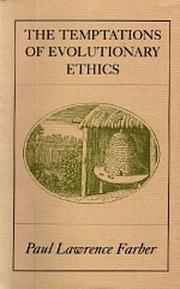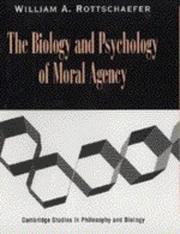| Listing 1 - 10 of 47 | << page >> |
Sort by
|
Book
ISBN: 9781405193979 1405193972 9781405193962 1405193964 1282884255 1444329510 9786612884252 1444329529 Year: 2011 Publisher: Chichester Wiley-Blackwell
Abstract | Keywords | Export | Availability | Bookmark
 Loading...
Loading...Choose an application
- Reference Manager
- EndNote
- RefWorks (Direct export to RefWorks)
Offering the first general introductory text to this subject, the timely Introduction to Evolutionary Ethics reflects the most up-to-date research and current issues being debated in both psychology and philosophy. The book presents students to the areas of cognitive psychology, normative ethics, and metaethics. * The first general introduction to evolutionary ethics * Provides a comprehensive survey of work in three distinct areas of research: cognitive psychology, normative ethics, and metaethics * Presents the most up-to-date research available in both psychology and philosophy * Written in an engaging and accessible style for undergraduates and the interested general reader * Discusses the evolution of morality, broadening its relevance to those studying psychology.
Ethics, Evolutionary --- Ethics, Naturalistic --- Evolutionary ethics --- Naturalistic ethics --- Ethics --- Ethical relativism --- Ethics, Evolutionary - Textbooks
Book
ISBN: 0674063074 9780674063075 9780674061446 0674061446 Year: 2011 Publisher: Cambridge, Mass. Harvard University Press
Abstract | Keywords | Export | Availability | Bookmark
 Loading...
Loading...Choose an application
- Reference Manager
- EndNote
- RefWorks (Direct export to RefWorks)
Principles of right and wrong guide the lives of almost all human beings, but we often see them as external to ourselves, outside our own control. In a revolutionary approach to the problems of moral philosophy, Philip Kitcher makes a provocative proposal: Instead of conceiving ethical commands as divine revelations or as the discoveries of brilliant thinkers, we should see our ethical practices as evolving over tens of thousands of years, as members of our species have worked out how to live together and prosper. Elaborating this radical new vision, Kitcher shows how the limited altruistic tendencies of our ancestors enabled a fragile social life, how our forebears learned to regulate their interactions with one another, and how human societies eventually grew into forms of previously unimaginable complexity. The most successful of the many millennia-old experiments in how to live, he contends, survive in our values today.Drawing on natural science, social science, and philosophy to develop an approach he calls "pragmatic naturalism," Kitcher reveals the power of an evolving ethics built around a few core principles-including justice and cooperation-but leaving room for a diversity of communities and modes of self-expression. Ethics emerges as a beautifully human phenomenon-permanently unfinished, collectively refined and distorted generation by generation. Our human values, Kitcher shows, can be understood not as a final system but as a project-the ethical project-in which our species has engaged for most of its history, and which has been central to who we are.
Ethics, Evolutionary. --- Ethics, Naturalistic --- Evolutionary ethics --- Naturalistic ethics --- Ethics --- Ethical relativism --- Ethics, Evolutionary
Book
ISBN: 1108515274 1316459403 110850633X 1107132959 1107589606 Year: 2017 Publisher: Cambridge : Cambridge University Press,
Abstract | Keywords | Export | Availability | Bookmark
 Loading...
Loading...Choose an application
- Reference Manager
- EndNote
- RefWorks (Direct export to RefWorks)
Evolutionary ethics - the application of evolutionary ideas to moral thinking and justification - began in the nineteenth century with the work of Charles Darwin and Herbert Spencer, but was subsequently criticized as an example of the naturalistic fallacy. In recent decades, however, evolutionary ethics has found new support among both the Darwinian and the Spencerian traditions. This accessible volume looks at the history of thought about evolutionary ethics as well as current debates in the subject, examining first the claims of supporters and then the responses of their critics. Topics covered include social Darwinism, moral realism, and debunking arguments. Clearly written and structured, the book guides readers through the arguments on both sides, and emphasises the continuing relevance of evolutionary theory to our understanding of ethics today.
Ethics, Evolutionary. --- Ethics, Naturalistic --- Evolutionary ethics --- Naturalistic ethics --- Ethics --- Ethical relativism
Book
ISBN: 303068802X 3030688011 Year: 2021 Publisher: Cham, Switzerland : Springer,
Abstract | Keywords | Export | Availability | Bookmark
 Loading...
Loading...Choose an application
- Reference Manager
- EndNote
- RefWorks (Direct export to RefWorks)
Ethics, Evolutionary. --- Ethics, Naturalistic --- Evolutionary ethics --- Naturalistic ethics --- Ethics --- Ethical relativism

ISBN: 0585176507 052092097X 9780520920972 9780585176505 9780520087736 0520087739 0520213696 0520087739 Year: 1994 Publisher: Berkley University of California Press
Abstract | Keywords | Export | Availability | Bookmark
 Loading...
Loading...Choose an application
- Reference Manager
- EndNote
- RefWorks (Direct export to RefWorks)
Evolutionary theory tells us about our biological past; can it also guide us to a moral future? Paul Farber's compelling book describes a century-old philosophical hope held by many biologists, anthropologists, psychologists, and social thinkers: that universal ethical and social imperatives are built into human nature and can be discovered through knowledge of evolutionary theory.Farber describes three upsurges of enthusiasm for evolutionary ethics. The first came in the early years of mid-nineteenth century evolutionary theories; the second in the 1920s and '30s, in the years after the cultural catastrophe of World War I; and the third arrived with the recent grand claims of sociobiology to offer a sound biological basis for a theory of human culture.Unlike many who have written on evolutionary ethics, Farber considers the responses made by philosophers over the years. He maintains that their devastating criticisms have been forgotten-thus the history of evolutionary ethics is essentially one of oft-repeated philosophical mistakes.Historians, scientists, social scientists, and anyone concerned about the elusive basis of selflessness, altruism, and morality will welcome Farber's enlightening book.
Ethics, Evolutionary --- Ethics, Naturalistic --- Evolutionary ethics --- Naturalistic ethics --- Ethics --- Ethical relativism --- History --- History. --- Philosophy --- ETHICS, EVOLUTIONARY --- PHILOSOPHY --- Ethics, evolutionary

ISBN: 0262532786 0262033100 Year: 2003 Publisher: Cambridge (Mass.): MIT press
Abstract | Keywords | Export | Availability | Bookmark
 Loading...
Loading...Choose an application
- Reference Manager
- EndNote
- RefWorks (Direct export to RefWorks)
Evolution. Phylogeny --- General ethics --- Ethics, Evolutionary --- Ethics, Naturalistic --- Evolutionary ethics --- Naturalistic ethics --- Ethics --- Ethical relativism --- Ethics, Evolutionary.

ISBN: 0521592658 0521064503 0511527357 Year: 1998 Publisher: Cambridge : Cambridge University Press,
Abstract | Keywords | Export | Availability | Bookmark
 Loading...
Loading...Choose an application
- Reference Manager
- EndNote
- RefWorks (Direct export to RefWorks)
This important book brings findings and theories in biology and psychology to bear on the fundamental question in ethics of what it means to behave morally. It explains how we acquire and put to work our capacities to act morally and how these capacities are reliable means to achieving true moral beliefs, proper moral motivations, and successful moral actions. By presenting a complete model of moral agency based on contemporary evolutionary theory, developmental biology and psychology, and social cognitive theory, the book offers a unique perspective. It will be read with profit by a broad swathe of philosophers, as well as psychologists and biologists.
Ethics, Evolutionary. --- Ethics, Evolutionary --- Ethics, Naturalistic --- Evolutionary ethics --- Naturalistic ethics --- Ethics --- Ethical relativism --- Arts and Humanities --- Philosophy

ISBN: 9027932336 Year: 1975 Publisher: The Hague Mouton
Abstract | Keywords | Export | Availability | Bookmark
 Loading...
Loading...Choose an application
- Reference Manager
- EndNote
- RefWorks (Direct export to RefWorks)
Professional ethics. Deontology --- Deontic logic --- Ethics, Evolutionary --- Ethics, Naturalistic --- Evolutionary ethics --- Naturalistic ethics --- Ethics --- Ethical relativism --- Logic, Deontic --- Duty --- Modality (Logic) --- Beroepsethiek. Deontologie
Book
ISBN: 0691024235 0691603863 140086030X Year: 2014 Publisher: Princeton, N.J. : Princeton University Press,
Abstract | Keywords | Export | Availability | Bookmark
 Loading...
Loading...Choose an application
- Reference Manager
- EndNote
- RefWorks (Direct export to RefWorks)
T. H. Huxley (1825-1895) was not only an active protagonist in the religious and scientific upheaval that followed the publication of Darwin's theory of evolution but also a harbinger of the sociobiological debates about the implications of evolution that are now going on. His seminal lecture Evolution and Ethics, reprinted here with its introductory Prolegomena, argues that the human psyche is at war with itself, that humans are alienated in a cosmos that has no special reference to their needs, and that moral societies are of necessity in conflict with the natural conditions of their existence. Seen in the light of current understanding of the mechanisms of evolution, these claims remain as controversial today as they were when Huxley proposed them. In this volume George Williams, one of the best-known evolutionary biologists of our time, asserts that recent biological ideas and data justify a more extreme condemnation of the "cosmic process" than Huxley advocated and more extreme denial that the forces that got us here are capable of maintaining a viable world. James Paradis, an expert in Victorian studies, has written an introduction that sets the celebrated lecture in the context of cultural history, revealing it to be an impressive synthesis of Victorian thinking, as well as a challenge to eighteenth-century assumptions about the harmony of of nature. With Huxley's lecture as a focal point, the three parts of this book unite philosophy and science in a shared quest that recalls their common origins as systems of knowledge.Originally published in 1989.The Princeton Legacy Library uses the latest print-on-demand technology to again make available previously out-of-print books from the distinguished backlist of Princeton University Press. These editions preserve the original texts of these important books while presenting them in durable paperback and hardcover editions. The goal of the Princeton Legacy Library is to vastly increase access to the rich scholarly heritage found in the thousands of books published by Princeton University Press since its founding in 1905.
Book
ISBN: 0262270021 0585480974 9780262270021 9780585480978 Year: 2003 Publisher: Cambridge, Mass. : MIT Press,
Abstract | Keywords | Export | Availability | Bookmark
 Loading...
Loading...Choose an application
- Reference Manager
- EndNote
- RefWorks (Direct export to RefWorks)
In Natural Ethical Facts William Casebeer argues that we can articulate a fully naturalized ethical theory using concepts from evolutionary biology and cognitive science, and that we can study moral cognition just as we study other forms of cognition. His goal is to show that we have "softly fixed" human natures, that these natures are evolved, and that our lives go well or badly depending on how we satisfy the functional demands of these natures. Natural Ethical Facts is a comprehensive examination of what a plausible moral science would look like. Casebeer begins by discussing the nature of ethics and the possible relationship between science and ethics. He then addresses David Hume's naturalistic fallacy and G. E. Moore's open-question argument, drawing on the work of John Dewey and W. V. O. Quine. He then proposes a functional account of ethics, offering corresponding biological and moral descriptions. Discussing in detail the neural correlates of moral cognition, he argues that neural networks can be used to model ethical function. He then discusses the impact his views of moral epistemology and ontology will have on traditional ethical theory and moral education, concluding that there is room for other moral theories as long as they take into consideration the functional aspect of ethics; the pragmatic neo-Aristotelian virtue theory he proposes thus serves as a moral "big tent." Finally, he addresses objections to ethical naturalism that may arise, and calls for a reconciliation of the sciences and the humanities. "Living well," Casebeer writes, "depends upon reweaving our ethical theories into the warp and woof of our scientific heritage, attending to the myriad consequences such a project will have for the way we live our lives and the manner in which we structure our collective moral institutions."
Ethics, Evolutionary --- Ethics --- Philosophy --- Philosophy & Religion --- Ethics, Naturalistic --- Evolutionary ethics --- Naturalistic ethics --- Ethical relativism --- Ethics, Evolutionary. --- PHILOSOPHY/General --- COGNITIVE SCIENCES/General
| Listing 1 - 10 of 47 | << page >> |
Sort by
|

 Search
Search Feedback
Feedback About
About Help
Help News
News